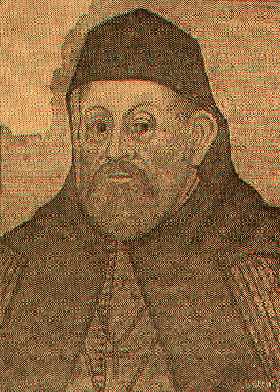![]()

Ipaci Pocei was born in Raz^anka near Hrodna in 1541 in a family of Leu Pocei, treasurer assistant ("padskarbi") and secretary of the GDL. He has got his education from Krakow Academy. After death of his father (1551) he was in suite of the king Z^yhimont-Auhust until 1972. After death of Z^yhimont-Auhust he was convinced by Pope's representative Kommendoni in the necessity of the unification of Orthodox and Catholic churches. Shortly after that Pocei went to the monastery detrimented by the death of his wife Anna. In 1590 Mitropolitan Rahoza has appointed Pocei as a bishop of Valadzimer and Biarescie (Brest). The same year Pocei and Terlecki have talked Rahoza into gathering a congress in Biarescie. This congress was opened on June 24, 1590 in Biarescie. Here for the first time an idea of Unia (Unity) with Rome was discussed.
In 1592 initiators of Unia has sent letters to king and Pope asking the permission to announce Unia. After this Pocei has gathered twice meetings of church leaders - in L'vou (January 28, 1592) and Lucak (August 27, 1592). In 1594 Mitropolit Rahoza assembled a general Congress in Biarescie. Of other religious figures, besides Pocei, Terlecki, Selecki, archbishop of Polacak Nifanael, Peramys^l' bishop Mihaila Kapyscenski, Pinsk bishop Liavonci and L'vou bishop Liavon Balaban were present. On the second day of December, 1594 an "Unia" treaty was signed between "Ruthenian" church and Catholic church. Representing Unia Pocei and Terlecki went to Rome to see Pope. On their way they were greeted by many European monarchs. On their arrival to Rome after the ceremony Pope Klim VIII has accepted them to Catholic Church. Pope has named Pocei as his home prelate. A medal was made with Pope Klim VIII on one side and Pocei and Terlecki on another with a signature: "Ruthenis receptis".
In 1595 Pocei publishes in Vil'na his "Unia or the teaching of major arguments for the unification of Greek and Roman Churches". Here he considers 5 main conflicts in interpretations between Orthodox and Catholic churches, trying to resolve them. He also tries to answer the accusations of Pope by protestants and radical Orthodox believers as an Anti-Christ.
Pocei and Terlecki talked Rahoza to gather a church congress in Biarescie in October 1596. Many Catholic and Orthodox priests arrived including famous Jesuits Piotr Skarga and Iustus Rabe. Also Hetman Grand Duke Mikalaj Krys^tof Radzivil, GDL's Chanceller Leu Sapeha, assistant treasurer of the Grand Duke Dzimitry Halicki were present. Orthodox and Catholic participants were hugging each other and celebrating unity - Unia. Soon after this Pope Urban VIII asked king Z^yhimont III to give Unia bishops equal privileges with latin priests. But Rahoza himself and L'vou bishop Balaban were already against Unia.
In 1600 Rahoza died and Pocei was elected as an Unia Mitropolit of all ruthenian lands. Once in power he had exiled from GDL an Orthodox exarch. Soon his repressions caused protests and unrests in his native Hrodna, Vil'na, Navahrudak where protestant communities were strong at the time. Valyn', Braslau, Kieu have protested too.
Pocei has expelled Orthodox archimandrite Sianc^yla from Vil'na and appointed Unia's Vel'iamin Rucki to his place. Vil'na citizen were extremely agitated and made a conspiracy to kill Rucki. But later they decided to rather start a lawsuit with Unia since it's actions were against Constitution of 1609, which guaranteed the same rights to Orthodox and Catholic churches. Judge Ian Ostyk ruled into Vil'na citizen favor and ordered Unia priest to leave Vil'na. But at this moment king Z^yhimont III himself interfered and ordered to give Pocej two former Orthodox churches.
On June 25, 1613 Pocei has died at the age of 72 in Valadzimer.
"Gistoryya belaruskaj (kryuskaj) knigi. Sproba payasnitel'naj knigopisi ad kanca X
da pachatku XIX stagoddzya" [The History of Belarusan (Creeve) Book. An Attempt of
Explanational Description From the End of X to the Beginning of XIX Century], Ed. V.
Lastouski, Published by the Belarusan Center in Lithuania, Publishing House of Sakalouski
and Lan, Kauno 1926.
UCB Library PG 2834.2 A12H51926 Main
 This file is a part of
the Virtual Guide to Belarus - a collaborative project
of Belarusian scientists and professionals
abroad. VG brings you the most extensive compilation of the information about Belarus on
the Web.
This file is a part of
the Virtual Guide to Belarus - a collaborative project
of Belarusian scientists and professionals
abroad. VG brings you the most extensive compilation of the information about Belarus on
the Web.
Please send your comments to the authors of VG to
Belarus
History | Statehood | Culture | Law and
Politics | Cities | Nature and Geography |
©1994-04 VG to Belarus
Disclaimer